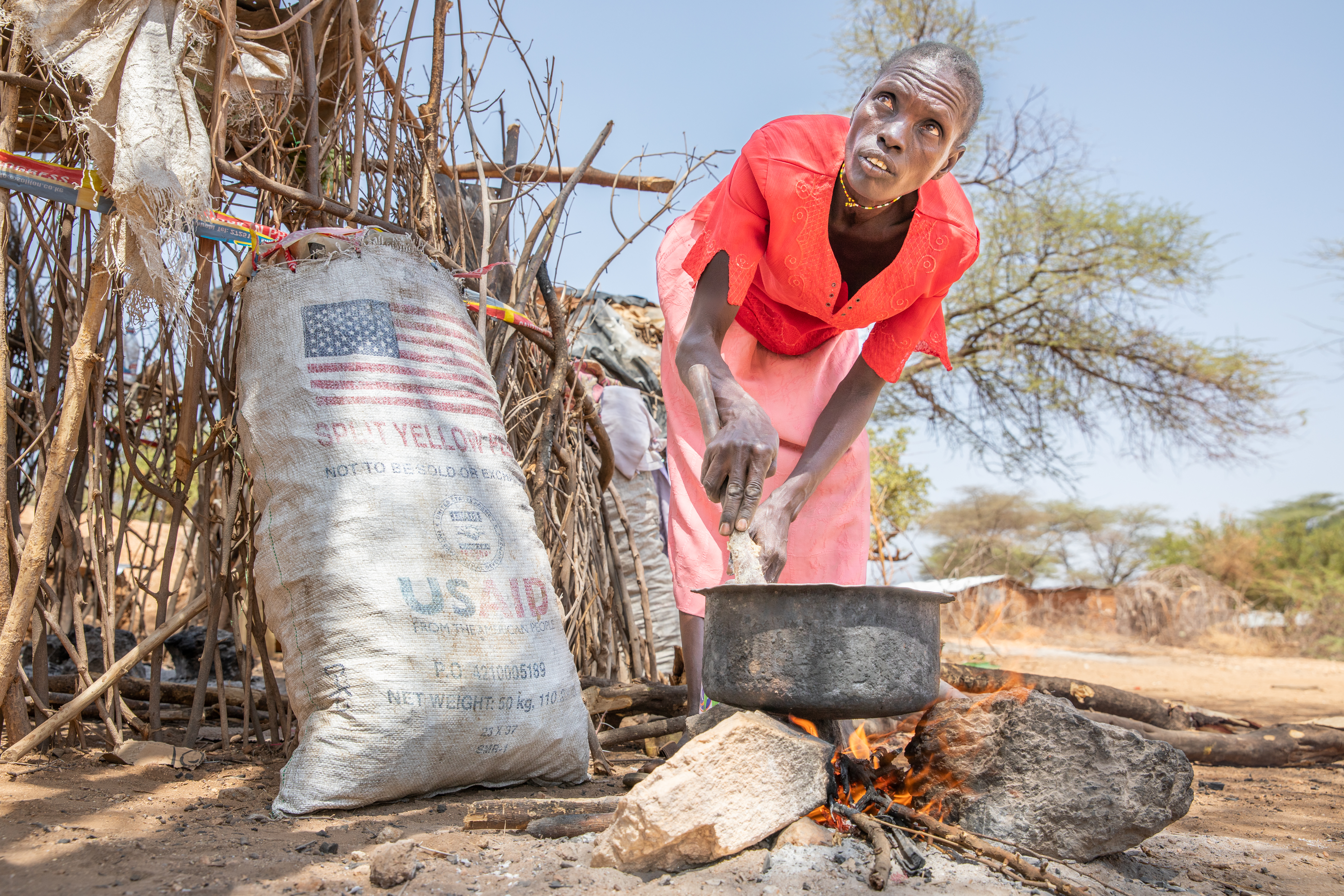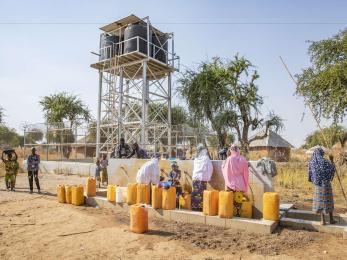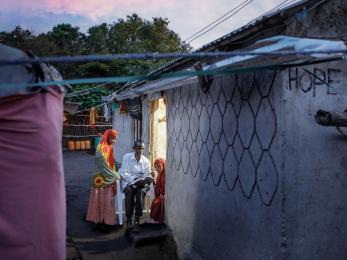Growing peace, one coffee farm at a time
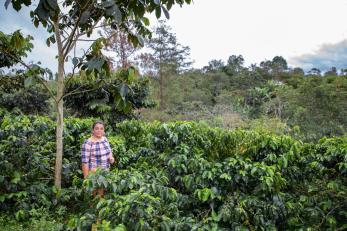
Mayerly is a farmer in a small village nestled high on rugged, verdant slopes of the Andes mountains of southwestern Colombia. She was born and raised in the El Tambo municipality, in the Cauca department, where her family and the community rely on agriculture to grow their livelihoods.
“I really like to raise animals, like our chickens and rabbits,” says Mayerly. She tends her animals on one hectare alongside her main crop of coffee. Mayerly’s family—her husband and their two school-age children—live and work on a farm with an abundance of grass on another hectare and a half where they let their cows graze. Although coffee crops provide financial stability for the family, it hasn’t always been this way.
Cultivating legal livelihoods, from coca to coffee
Mayerly’s farm, like thousands of smallholder farms in Colombia, was once used to primarily produce coca leaves—the key ingredient in cocaine. As recent as 2022, the department of Cauca produced an estimated 18% of the coca produced in Colombia. The nation has long been known as the source of roughly two-thirds of coca used in producing cocaine globally.
Coca is a significant crop because it fetches prices that enable growers to have economic stability. Until recently, coca leaves generated much more income for farmers compared with legal crops such as coffee, palm oil, and cacao. Growing coca, however, is a source of stress. “With coca, we were unsafe,” Mayerly says. “And we always ran the risk of being taken to jail and having our kids taken away.”
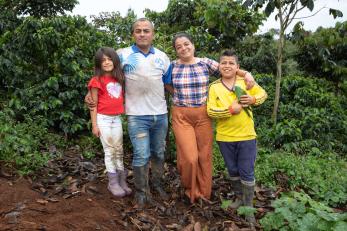
Mayerly’s journey into coffee began when Mercy Corps invited her to attend a meeting about the benefits of substituting coca with legal crops. Mercy Corps held community meetings and one-on-one conversations with participants to discuss risks of moving away from growing illicit crops. The aim was to inform growers who might be thinking about the complicated and expensive undertaking of exiting coca and beginning an entirely different crop, such as coffee.
Initially, Mayerly admits she was fearful. “I was scared. I didn’t go” to the first meeting. Mayerly and her husband eventually joined awareness-raising meetings, workshops on technical assistance, and replaced all of their coca plants with coffee. By removing illicit crops, Mayerly received technical expertise and other support as part of ALGO Nuevo, or “something new”, a Mercy Corps programme that aims to build a vibrant rural economy by advancing legal livelihoods, expanding land property rights, and strengthening more sustainable access to markets in Cauca.
That tough decision put Mayerly on a path to where she is today—cultivating roughly 12,000 coffee trees on 2.5 hectares of land. As of summer of 2024, ALGO Nuevo has supported more than 3,000 agricultural producers across Cauca in replacing 1,805 hectares of coca with high-quality coffee production. “We can say [the transition] has been a total success,” Mayerly says. “It’s a reality that we sustain our families with coffee instead of illicit crops.”
Mercy Corps partners with the local cooperative, Caficauca, to support farmers in getting their coffee to market. The market connection is critical because when Mayerly and other farmers were growing coca, they didn’t have to bring their crop to market. They had a single customer that came to them—a drug cartel. Caficauca connects farmers directly with customers in order to earn the best possible rate for their coffee.
Land titling is core to peacemaking
In addition to supporting farmers to move into growing legal crops, ALGO Nuevo’s approach to promoting more peaceful futures has assisted hundreds of farmers in Cauca, including Mayerly, to receive the title for their properties. Land titling provides rural farmers with something that has been missing for generations—security over their properties.
In Cauca, Norte de Santander, and elsewhere within the country, the lack of official land titling has allowed armed groups and drug traffickers to force small farmers to grow coca plants or face violence. It’s one of the reasons an estimated 6.8 million people have been displaced within Colombia. Although origins of conflict that drive displacement within Colombia are complex, drug trafficking often is at the crux of it. When families no longer engage with coca buyers, land conflicts and displacement due to coca trafficking decline throughout communities.
Having official proof of land ownership is helping legitimize Mayerly’s business and provides her ability to access resources previously unavailable, such as bank loans. “We decided as a community to have more peace and no more armed groups in our area,” Mayerly says.
“We are assured that we can leave these properties to our children. That is something very important we’ve been able to do with the program,” Mayerly says. With crucial support from Colombia’s National Land Agency, ALGO Nuevo has assisted Mayerly and almost 40 other farmers in El Tambo receive titles. Nearly 370 families have received land titles across Cauca. A sister program—ProTierra Catatumbo—is supporting farmers in the Norte de Santander department to also advance legal livelihoods, expand property rights, and secure access to profitable markets in the region.
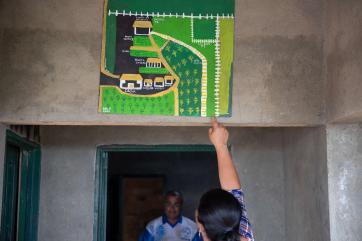
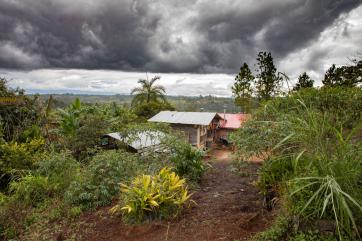
In addition to individual family farms, Mercy Corps has supported formalised ownership of public lands, including for schools and health clinics. This means social investment is attainable in El Tambo, there is a lack of basic services and infrastructure. “Formalising the public lots for the schools, sports centres, soccer fields … generates stability and improvement,” Mayerly says.
For her part, Mayerly has been active in collaborating with ALGO Nuevo within her community by inviting more families to attend meetings and leading trainings. She has received recognition for her work leading her region toward progress, including an award commending her effort to support land titling in rural Colombia.
In pursuing what matters, leadership comes naturally for Mayerly. It’s why she became president of her community association, worked for the local preschool, and studied to become a nursing assistant. “I was born wanting to help,” says Mayerly, who’s now studying for a degree in business administration. “I’ve liked being a leader, I’ve always wanted to help my community succeed.”

